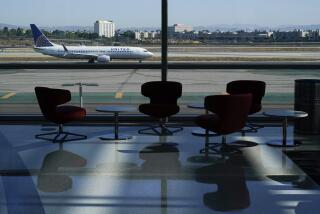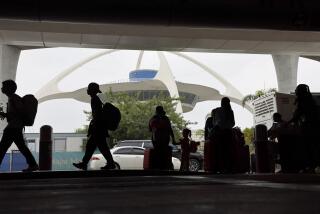Limits Sought on Airport Delays
- Share via
WASHINGTON — Federal officials are seeking ways to limit airport evacuations like the one that affected thousands of people Monday at Los Angeles International Airport and an “embarrassing” lapse that shut down half the airport last week.
Two terminals were cleared on Monday after screeners spotted what appeared to be a hand grenade in a piece of luggage belonging to a male passenger.
Just four days earlier, the discovery of an unplugged metal detector shut down half of LAX and delayed 400 flights and at least 10,000 travelers for nearly four hours. Another unplugged detector forced a smaller shutdown at Chicago’s O’Hare International the same day.
“This is an embarrassing kind of thing,” Transportation Secretary Norman Y. Mineta said at a news conference Monday.
He said technicians are scrambling to find a way to secure the electrical plugs. And he pledged to find ways to limit massive evacuations over minor breaches, which critics have warned could create unforeseen safety and security problems.
“We are trying to look at airports and trying to ask, ‘What is the logical way to compartmentalize?’” Mineta said. “Even though an incident occurs, is there a way to compartmentalize so we don’t have to shut down the whole airport and impact thousands of people?”
Officials have already taken some steps, Mineta said.
For example, airport concourse exits are now covered by two guards. If someone tries to rush in through the exit, one guard can chase the intruder while the other makes sure no one else is trying to get in. That should reduce having to empty out a whole concourse if someone tries to use the exit to bypass security checkpoints.
Another change involves the Atlanta airport, which was shut down last year after a man in a hurry to make a flight went the wrong way on an escalator to get around security lines. Technicians have reprogrammed the electric trams that take passengers from the check-in area to their gates so the doors can be sealed, trapping anyone who tried to get around security.
There are dozens of security incidents each day at the 429 airports that came under federal supervision on Feb. 17. Shutting down concourses has become more common since Mineta announced a “zero-tolerance” policy toward security breaches last October. The Federal Aviation Administration is compiling up-to-date statistics on numbers of incidents.
Separately, officials confirmed that nine of the 19 Sept. 11 hijackers were singled out for additional security measures the day of the attacks. But the extra screening--their checked bags were scanned for explosives--failed to turn up anything suspicious, and the hijackers were allowed to board, apparently without being questioned. The information was first reported by the Washington Post.
Six of the hijackers were flagged by a computerized passenger screening system, and three others because of irregularities in their travel documents. If the same situation were to occur today, the individuals--not just their bags--would be searched, officials said.
“At the time, our procedures were based on what our intelligence community perceived as the threat, and that perceived threat was a bomb in checked baggage,” a federal official said. “The procedures were followed properly.”
Congress is expected to look into the incidents as part of any investigation into the events of Sept. 11.
Meanwhile, the Transportation Security Administration announced a campaign to recruit 30,000 federal security screeners at wages ranging from $13.35 to nearly $19.60 an hour, depending on experience, job responsibilities and location. Screeners at LAX already earn $14 an hour, one of the highest rates in the country.
The Transportation Department is hoping its campaign will result in a professional work force with much higher standards of vigilance and service. Javier Gonzalez, a union official working with screeners at LAX, said the salary range should be attractive in most parts of the country.
“It’s decent,” Gonzalez said. “I thought it would be less.”
More to Read
Sign up for Essential California
The most important California stories and recommendations in your inbox every morning.
You may occasionally receive promotional content from the Los Angeles Times.










